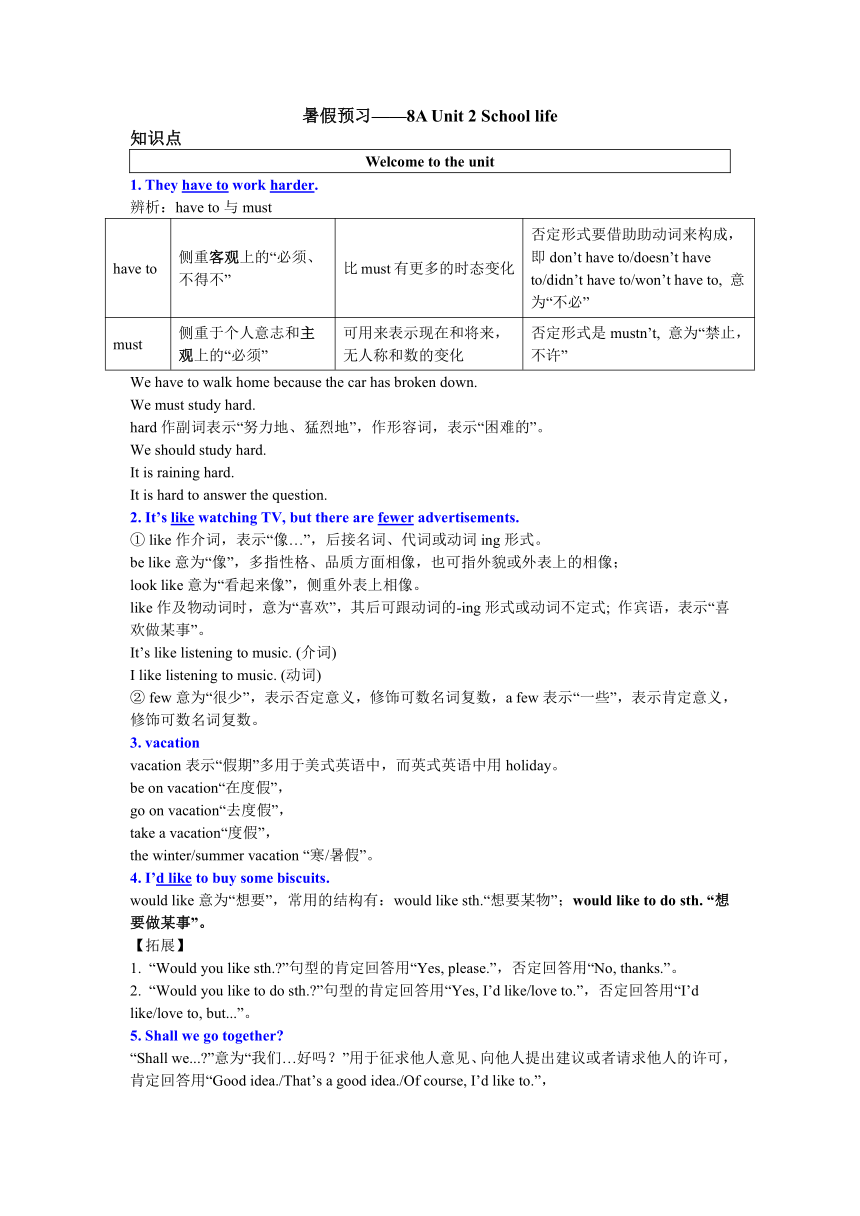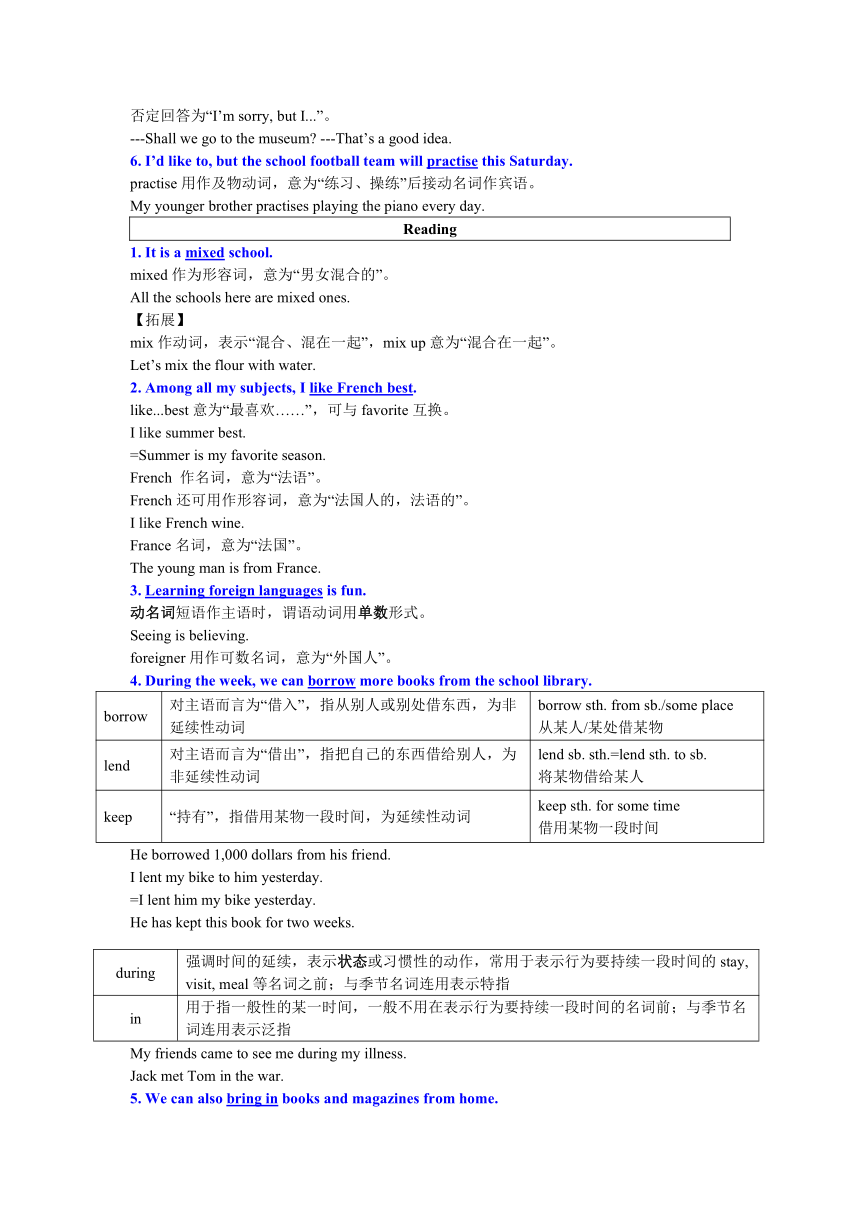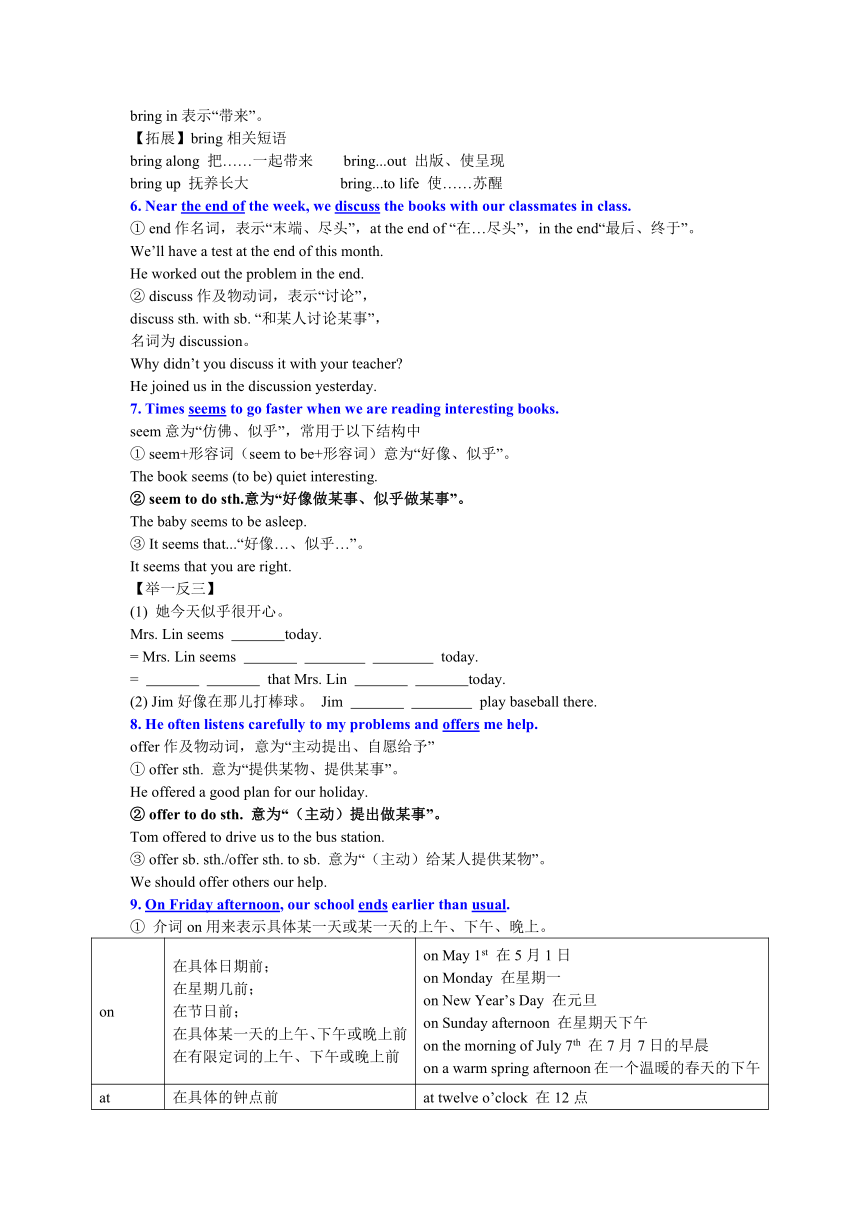2023年牛津译林版英语八年级上册暑假预习讲义 Unit 2 School life(无答案)
文档属性
| 名称 | 2023年牛津译林版英语八年级上册暑假预习讲义 Unit 2 School life(无答案) |  | |
| 格式 | docx | ||
| 文件大小 | 36.6KB | ||
| 资源类型 | 教案 | ||
| 版本资源 | 牛津译林版 | ||
| 科目 | 英语 | ||
| 更新时间 | 2023-07-30 08:56:29 | ||
图片预览



文档简介
暑假预习——8A Unit 2 School life
知识点
Welcome to the unit
1. They have to work harder.
辨析:have to与must
have to 侧重客观上的“必须、不得不” 比must有更多的时态变化 否定形式要借助助动词来构成,即don’t have to/doesn’t have to/didn’t have to/won’t have to, 意为“不必”
must 侧重于个人意志和主观上的“必须” 可用来表示现在和将来,无人称和数的变化 否定形式是mustn’t, 意为“禁止,不许”
We have to walk home because the car has broken down.
We must study hard.
hard作副词表示“努力地、猛烈地”,作形容词,表示“困难的”。
We should study hard.
It is raining hard.
It is hard to answer the question.
2. It’s like watching TV, but there are fewer advertisements.
① like作介词,表示“像…”,后接名词、代词或动词ing形式。
be like意为“像”,多指性格、品质方面相像,也可指外貌或外表上的相像;
look like意为“看起来像”,侧重外表上相像。
like作及物动词时,意为“喜欢”,其后可跟动词的-ing形式或动词不定式; 作宾语,表示“喜欢做某事”。
It’s like listening to music. (介词)
I like listening to music. (动词)
② few意为“很少”,表示否定意义,修饰可数名词复数,a few表示“一些”,表示肯定意义,修饰可数名词复数。
3. vacation
vacation表示“假期”多用于美式英语中,而英式英语中用holiday。
be on vacation“在度假”,
go on vacation“去度假”,
take a vacation“度假”,
the winter/summer vacation “寒/暑假”。
4. I’d like to buy some biscuits.
would like意为“想要”,常用的结构有:would like sth.“想要某物”;would like to do sth. “想要做某事”。
【拓展】
“Would you like sth. ”句型的肯定回答用“Yes, please.”,否定回答用“No, thanks.”。
“Would you like to do sth. ”句型的肯定回答用“Yes, I’d like/love to.”,否定回答用“I’d like/love to, but...”。
5. Shall we go together
“Shall we... ”意为“我们…好吗?”用于征求他人意见、向他人提出建议或者请求他人的许可,
肯定回答用“Good idea./That’s a good idea./Of course, I’d like to.”,
否定回答为“I’m sorry, but I...”。
---Shall we go to the museum ---That’s a good idea.
6. I’d like to, but the school football team will practise this Saturday.
practise用作及物动词,意为“练习、操练”后接动名词作宾语。
My younger brother practises playing the piano every day.
Reading
1. It is a mixed school.
mixed作为形容词,意为“男女混合的”。
All the schools here are mixed ones.
【拓展】
mix作动词,表示“混合、混在一起”,mix up意为“混合在一起”。
Let’s mix the flour with water.
2. Among all my subjects, I like French best.
like...best意为“最喜欢……”,可与favorite互换。
I like summer best.
=Summer is my favorite season.
French 作名词,意为“法语”。
French还可用作形容词,意为“法国人的,法语的”。
I like French wine.
France名词,意为“法国”。
The young man is from France.
3. Learning foreign languages is fun.
动名词短语作主语时,谓语动词用单数形式。
Seeing is believing.
foreigner用作可数名词,意为“外国人”。
4. During the week, we can borrow more books from the school library.
borrow 对主语而言为“借入”,指从别人或别处借东西,为非延续性动词 borrow sth. from sb./some place 从某人/某处借某物
lend 对主语而言为“借出”,指把自己的东西借给别人,为非延续性动词 lend sb. sth.=lend sth. to sb. 将某物借给某人
keep “持有”,指借用某物一段时间,为延续性动词 keep sth. for some time 借用某物一段时间
He borrowed 1,000 dollars from his friend.
I lent my bike to him yesterday.
=I lent him my bike yesterday.
He has kept this book for two weeks.
during 强调时间的延续,表示状态或习惯性的动作,常用于表示行为要持续一段时间的stay, visit, meal等名词之前;与季节名词连用表示特指
in 用于指一般性的某一时间,一般不用在表示行为要持续一段时间的名词前;与季节名词连用表示泛指
My friends came to see me during my illness.
Jack met Tom in the war.
5. We can also bring in books and magazines from home.
bring in表示“带来”。
【拓展】bring相关短语
bring along 把……一起带来 bring...out 出版、使呈现
bring up 抚养长大 bring...to life 使……苏醒
6. Near the end of the week, we discuss the books with our classmates in class.
① end作名词,表示“末端、尽头”,at the end of “在…尽头”,in the end“最后、终于”。
We’ll have a test at the end of this month.
He worked out the problem in the end.
② discuss作及物动词,表示“讨论”,
discuss sth. with sb. “和某人讨论某事”,
名词为discussion。
Why didn’t you discuss it with your teacher
He joined us in the discussion yesterday.
7. Times seems to go faster when we are reading interesting books.
seem意为“仿佛、似乎”,常用于以下结构中
① seem+形容词(seem to be+形容词)意为“好像、似乎”。
The book seems (to be) quiet interesting.
② seem to do sth.意为“好像做某事、似乎做某事”。
The baby seems to be asleep.
③ It seems that...“好像…、似乎…”。
It seems that you are right.
【举一反三】
(1) 她今天似乎很开心。
Mrs. Lin seems today.
= Mrs. Lin seems today.
= that Mrs. Lin today.
(2) Jim好像在那儿打棒球。 Jim play baseball there.
8. He often listens carefully to my problems and offers me help.
offer作及物动词,意为“主动提出、自愿给予”
① offer sth. 意为“提供某物、提供某事”。
He offered a good plan for our holiday.
② offer to do sth. 意为“(主动)提出做某事”。
Tom offered to drive us to the bus station.
③ offer sb. sth./offer sth. to sb. 意为“(主动)给某人提供某物”。
We should offer others our help.
9. On Friday afternoon, our school ends earlier than usual.
① 介词on用来表示具体某一天或某一天的上午、下午、晚上。
on 在具体日期前; 在星期几前; 在节日前; 在具体某一天的上午、下午或晚上前 在有限定词的上午、下午或晚上前 on May 1st 在5月1日 on Monday 在星期一 on New Year’s Day 在元旦 on Sunday afternoon 在星期天下午 on the morning of July 7th 在7月7日的早晨 on a warm spring afternoon在一个温暖的春天的下午
at 在具体的钟点前 at twelve o’clock 在12点
in 在泛指的上午、下午或晚上前; 在年、月或季节前 in the morning 在上午 in 2013 在2013年 in January 在1月 in spring 在春天
② end用作动词,表示“结束”,相当于be over。
What time does your school end
③ usual意为“平常的、通常的”,as usual表示“像往常一样”。
As usual, he got to school at 7 o’clock.
10. Our team won two games last month.
win此处用作及物动词,意为“赢得”,也可以作不及物动词,表示“获胜,赢”。
【拓展】辨析win和beat/defeat
win所接的宾语一般表示比赛、战斗、辩论、奖金等名词;
beat/defeat所接的宾语是参加比赛的人或者团队,意为“战胜、打败(某人)”。
Li Lei beat Tom and won the first prize.
11. Both Nancy and John are Grade 8 students.
both...and...表示“…和…都、既…又…”,在句中连接两个并列关系的词。
Tom can both sing and dance.
Both Jim and his elder sister are good at English.
Grammar
1. further
further是far的比较级,far的比较级有两种形式,即farther和further,
farther表示具体的距离上“更远、较远”;
further除了表示距离上“更远”以外,还可以表示抽象意义上“更进一步”。
Jim can jump farther than his brother.
Many students send their children to foreign countries for further study.
2. She draws better than any other student in my class.
“比较级+than any other+单数名词”意为“比其它任何一个都……”,该结构形式上是比较级,实际表达最高级含义,该结构中的名词必须用单数形式。
Tom swims faster than any other boy of the three.
=Tom swims fastest of the three boys.
3. a number of 和 the number of
the number of…表示“…的数量”。作主语的中心词时,谓语动词用单数形式,后常跟large, small等词作表语。
我们学校的学生数量非常大。
The number of the students very in our school.
a number of表示“若干的;许多的”。起修饰作用,相当于many或a lot of,a number of+复数可数名词作主语时,其谓语动词用复数形式。
A number of the students playing football. 许多学生在踢足球。
Integrated skills
1. How much time do students spend on homework every day
spend+时间/金钱+on sth.或者spend+时间/金钱+(in) doing sth.。
【拓展】辨析spend, pay, take和cost
spend 主语是人 spend...on sth./spend...(in) doing sth.
pay 主语是人 pay for sth./pay sb. for sth.
take 主语是it It takes sb.+时间+to do sth.
cost 主语是物 sth. costs sb.+金钱
【举一反三】
(1) My mother spends two hours doing housework every day. (同义句)
My mother two hours housework every day.
It my mother two hours every day.
(2) 你每天花多长时间读英语?。
How long does it you read English every day
2. Do students wear uniforms
辨析wear, put on和dress
wear 穿着 侧重于穿戴的状态 The girl wears a red coat today.
put on 穿上 侧重于穿戴的动作 Put on your coat. It is cold outside.
dress 给……穿衣服 指给自己或者他人穿衣服 The boy is too young to dress himself.
3. Chinese students have more weeks off for the summer holiday than British students.
“have+一段时间+off”意为“休息多长时间、放假多长时间”。
They will have three weeks off for the winter holiday.
Study skills
1. daily
daily作形容词,表示“每日的、日常的”,相当于everyday。
There was little change in their daily life.
2. I looked through the question quickly.
look through意为“浏览、快速查看、透过…看”。
Before you answer these questions, you’d better look through them first.
Look through the window, and you can see the beautiful view.
3. I read very slowly at first, but I am doing better now.
at first意为“首先、起初”,相当于first of all,反义词为at last或者in the end。
4. I also keep writing in English about my daily life.
keep (on) doing sth.意为“继续做某事、重复做某事”。
They kept talking about it.
Task
1. How long is lunchtime at your school
辨析how long, how soon和how often
how long “多长时间”,提问for和since引出的时间状语 ---How long did you stay there ---For about two weeks.
how soon “多久”提问“in+一段时间” ---How soon will they come back ---In two weeks.
how often “多久一次”,提问动作发生的频率 ---How often do you go home ---Once a week.
2. Do you think your school is a good one
one用作不定代词,指代前面提到过的那类事物中的一个,复数为ones。one指同一类事物,it指同一个事物。
I have a new hat and several old ones.
The coat is hers. It’s very beautiful.
3. I love computers, so I have computer lessons every day.
so作连词,意为“因此、所以”,表示结果,不可以和because同时连用。
Lily is very kind, so every likes her.
4. We always have fun.
have fun意为“玩得开心”,相当于have a good time,
后接名词时加上介词with,即have fun with sth.;
接动词时,用动词的ing形式,即have fun doing sth.。
The children have a lot of fun with the building blocks.
We had fun playing in the park.
5. To me, learning foreign languages is really (real) fun. 对我来说,学习外语的确(真的)很有意思。
辨析:real 与true
real 指客观存在的实物,实情和实例,而不是想象的或虚构的
true 强调符合事实,是真的,而不是虚伪的、错误的
语法点
数量的比较
1.两者之间数量上的比较
(1)可用more…than...结构表示“…比…多”,more后可接可数名词复数或不可数名词。
He has more books than me.
She has more free time than me.
(2)可用fewer/less…than…结构表示“……比…少”,fewer后接可数名词复数,less后接不可数名词。
Tom is in fewer clubs than Jack.
We drink less coffee than tea.
2.三者或三者以上数量上的比较
(1)用the most“最多”,它后面既可跟可数名词复数,也可跟不可数名词。
Bob got the most points in our class.
Simon drinks the most milk.
(2)用the fewest或the least表示“最少”,前者用来修饰可数名词复数,后者用来修饰不可数名词。
She can sing the fewest songs in our class.
He finishes the least homework of us three.
3.副词比较等级的用法
(1)A+动词(实义动词)+副词比较级+than+B.当than前后使用的动词相同时,通常用助动词代替后面自动词,该动词或助动词可以省略。
He works harder than you(do).
I got up earlier than my mother(did).
(2)说明“和B比起来,更喜欢A”时,要用well的比较级better,用“Sb like(s)A better than B”句型。
I like spring better than winter.
(3)当询问对方比较两者后作出选择,可用句型Which/Who do you like better,A or B
Which do you like better,red or blue
(4)副词比较级前可加much,a little,even,far,a lot;修饰词来加强语气。
Tony jumps much higher than Jim.
4.副词的最高级用法
常用句型:A+动词(实义动词)+(the)副词最高级+of/in/among…。
Amy writes(the)most carefully in our class.
【举一反三】
1. Helen joins the fewest clubs in her class.
Helen joins __________ clubs than __________ other student in her class.
2. Henry has less juice in the bottle than the other five children.
Henry has __________ __________ juice in the bottle of the six children.
3. Tom scored 9 points. Mike scored 7 points. Jill scored 5 points.
Jill scored __________ __________ points of the three.
4. Amy runs the fastest among all the students in her class.
Amy runs __________ than the other __________ in her class.
Amy runs __________ than any __________ __________ in her class.
5. John didn’t dance as well as Alan.
Alan danced __________ __________ John.
知识点
Welcome to the unit
1. They have to work harder.
辨析:have to与must
have to 侧重客观上的“必须、不得不” 比must有更多的时态变化 否定形式要借助助动词来构成,即don’t have to/doesn’t have to/didn’t have to/won’t have to, 意为“不必”
must 侧重于个人意志和主观上的“必须” 可用来表示现在和将来,无人称和数的变化 否定形式是mustn’t, 意为“禁止,不许”
We have to walk home because the car has broken down.
We must study hard.
hard作副词表示“努力地、猛烈地”,作形容词,表示“困难的”。
We should study hard.
It is raining hard.
It is hard to answer the question.
2. It’s like watching TV, but there are fewer advertisements.
① like作介词,表示“像…”,后接名词、代词或动词ing形式。
be like意为“像”,多指性格、品质方面相像,也可指外貌或外表上的相像;
look like意为“看起来像”,侧重外表上相像。
like作及物动词时,意为“喜欢”,其后可跟动词的-ing形式或动词不定式; 作宾语,表示“喜欢做某事”。
It’s like listening to music. (介词)
I like listening to music. (动词)
② few意为“很少”,表示否定意义,修饰可数名词复数,a few表示“一些”,表示肯定意义,修饰可数名词复数。
3. vacation
vacation表示“假期”多用于美式英语中,而英式英语中用holiday。
be on vacation“在度假”,
go on vacation“去度假”,
take a vacation“度假”,
the winter/summer vacation “寒/暑假”。
4. I’d like to buy some biscuits.
would like意为“想要”,常用的结构有:would like sth.“想要某物”;would like to do sth. “想要做某事”。
【拓展】
“Would you like sth. ”句型的肯定回答用“Yes, please.”,否定回答用“No, thanks.”。
“Would you like to do sth. ”句型的肯定回答用“Yes, I’d like/love to.”,否定回答用“I’d like/love to, but...”。
5. Shall we go together
“Shall we... ”意为“我们…好吗?”用于征求他人意见、向他人提出建议或者请求他人的许可,
肯定回答用“Good idea./That’s a good idea./Of course, I’d like to.”,
否定回答为“I’m sorry, but I...”。
---Shall we go to the museum ---That’s a good idea.
6. I’d like to, but the school football team will practise this Saturday.
practise用作及物动词,意为“练习、操练”后接动名词作宾语。
My younger brother practises playing the piano every day.
Reading
1. It is a mixed school.
mixed作为形容词,意为“男女混合的”。
All the schools here are mixed ones.
【拓展】
mix作动词,表示“混合、混在一起”,mix up意为“混合在一起”。
Let’s mix the flour with water.
2. Among all my subjects, I like French best.
like...best意为“最喜欢……”,可与favorite互换。
I like summer best.
=Summer is my favorite season.
French 作名词,意为“法语”。
French还可用作形容词,意为“法国人的,法语的”。
I like French wine.
France名词,意为“法国”。
The young man is from France.
3. Learning foreign languages is fun.
动名词短语作主语时,谓语动词用单数形式。
Seeing is believing.
foreigner用作可数名词,意为“外国人”。
4. During the week, we can borrow more books from the school library.
borrow 对主语而言为“借入”,指从别人或别处借东西,为非延续性动词 borrow sth. from sb./some place 从某人/某处借某物
lend 对主语而言为“借出”,指把自己的东西借给别人,为非延续性动词 lend sb. sth.=lend sth. to sb. 将某物借给某人
keep “持有”,指借用某物一段时间,为延续性动词 keep sth. for some time 借用某物一段时间
He borrowed 1,000 dollars from his friend.
I lent my bike to him yesterday.
=I lent him my bike yesterday.
He has kept this book for two weeks.
during 强调时间的延续,表示状态或习惯性的动作,常用于表示行为要持续一段时间的stay, visit, meal等名词之前;与季节名词连用表示特指
in 用于指一般性的某一时间,一般不用在表示行为要持续一段时间的名词前;与季节名词连用表示泛指
My friends came to see me during my illness.
Jack met Tom in the war.
5. We can also bring in books and magazines from home.
bring in表示“带来”。
【拓展】bring相关短语
bring along 把……一起带来 bring...out 出版、使呈现
bring up 抚养长大 bring...to life 使……苏醒
6. Near the end of the week, we discuss the books with our classmates in class.
① end作名词,表示“末端、尽头”,at the end of “在…尽头”,in the end“最后、终于”。
We’ll have a test at the end of this month.
He worked out the problem in the end.
② discuss作及物动词,表示“讨论”,
discuss sth. with sb. “和某人讨论某事”,
名词为discussion。
Why didn’t you discuss it with your teacher
He joined us in the discussion yesterday.
7. Times seems to go faster when we are reading interesting books.
seem意为“仿佛、似乎”,常用于以下结构中
① seem+形容词(seem to be+形容词)意为“好像、似乎”。
The book seems (to be) quiet interesting.
② seem to do sth.意为“好像做某事、似乎做某事”。
The baby seems to be asleep.
③ It seems that...“好像…、似乎…”。
It seems that you are right.
【举一反三】
(1) 她今天似乎很开心。
Mrs. Lin seems today.
= Mrs. Lin seems today.
= that Mrs. Lin today.
(2) Jim好像在那儿打棒球。 Jim play baseball there.
8. He often listens carefully to my problems and offers me help.
offer作及物动词,意为“主动提出、自愿给予”
① offer sth. 意为“提供某物、提供某事”。
He offered a good plan for our holiday.
② offer to do sth. 意为“(主动)提出做某事”。
Tom offered to drive us to the bus station.
③ offer sb. sth./offer sth. to sb. 意为“(主动)给某人提供某物”。
We should offer others our help.
9. On Friday afternoon, our school ends earlier than usual.
① 介词on用来表示具体某一天或某一天的上午、下午、晚上。
on 在具体日期前; 在星期几前; 在节日前; 在具体某一天的上午、下午或晚上前 在有限定词的上午、下午或晚上前 on May 1st 在5月1日 on Monday 在星期一 on New Year’s Day 在元旦 on Sunday afternoon 在星期天下午 on the morning of July 7th 在7月7日的早晨 on a warm spring afternoon在一个温暖的春天的下午
at 在具体的钟点前 at twelve o’clock 在12点
in 在泛指的上午、下午或晚上前; 在年、月或季节前 in the morning 在上午 in 2013 在2013年 in January 在1月 in spring 在春天
② end用作动词,表示“结束”,相当于be over。
What time does your school end
③ usual意为“平常的、通常的”,as usual表示“像往常一样”。
As usual, he got to school at 7 o’clock.
10. Our team won two games last month.
win此处用作及物动词,意为“赢得”,也可以作不及物动词,表示“获胜,赢”。
【拓展】辨析win和beat/defeat
win所接的宾语一般表示比赛、战斗、辩论、奖金等名词;
beat/defeat所接的宾语是参加比赛的人或者团队,意为“战胜、打败(某人)”。
Li Lei beat Tom and won the first prize.
11. Both Nancy and John are Grade 8 students.
both...and...表示“…和…都、既…又…”,在句中连接两个并列关系的词。
Tom can both sing and dance.
Both Jim and his elder sister are good at English.
Grammar
1. further
further是far的比较级,far的比较级有两种形式,即farther和further,
farther表示具体的距离上“更远、较远”;
further除了表示距离上“更远”以外,还可以表示抽象意义上“更进一步”。
Jim can jump farther than his brother.
Many students send their children to foreign countries for further study.
2. She draws better than any other student in my class.
“比较级+than any other+单数名词”意为“比其它任何一个都……”,该结构形式上是比较级,实际表达最高级含义,该结构中的名词必须用单数形式。
Tom swims faster than any other boy of the three.
=Tom swims fastest of the three boys.
3. a number of 和 the number of
the number of…表示“…的数量”。作主语的中心词时,谓语动词用单数形式,后常跟large, small等词作表语。
我们学校的学生数量非常大。
The number of the students very in our school.
a number of表示“若干的;许多的”。起修饰作用,相当于many或a lot of,a number of+复数可数名词作主语时,其谓语动词用复数形式。
A number of the students playing football. 许多学生在踢足球。
Integrated skills
1. How much time do students spend on homework every day
spend+时间/金钱+on sth.或者spend+时间/金钱+(in) doing sth.。
【拓展】辨析spend, pay, take和cost
spend 主语是人 spend...on sth./spend...(in) doing sth.
pay 主语是人 pay for sth./pay sb. for sth.
take 主语是it It takes sb.+时间+to do sth.
cost 主语是物 sth. costs sb.+金钱
【举一反三】
(1) My mother spends two hours doing housework every day. (同义句)
My mother two hours housework every day.
It my mother two hours every day.
(2) 你每天花多长时间读英语?。
How long does it you read English every day
2. Do students wear uniforms
辨析wear, put on和dress
wear 穿着 侧重于穿戴的状态 The girl wears a red coat today.
put on 穿上 侧重于穿戴的动作 Put on your coat. It is cold outside.
dress 给……穿衣服 指给自己或者他人穿衣服 The boy is too young to dress himself.
3. Chinese students have more weeks off for the summer holiday than British students.
“have+一段时间+off”意为“休息多长时间、放假多长时间”。
They will have three weeks off for the winter holiday.
Study skills
1. daily
daily作形容词,表示“每日的、日常的”,相当于everyday。
There was little change in their daily life.
2. I looked through the question quickly.
look through意为“浏览、快速查看、透过…看”。
Before you answer these questions, you’d better look through them first.
Look through the window, and you can see the beautiful view.
3. I read very slowly at first, but I am doing better now.
at first意为“首先、起初”,相当于first of all,反义词为at last或者in the end。
4. I also keep writing in English about my daily life.
keep (on) doing sth.意为“继续做某事、重复做某事”。
They kept talking about it.
Task
1. How long is lunchtime at your school
辨析how long, how soon和how often
how long “多长时间”,提问for和since引出的时间状语 ---How long did you stay there ---For about two weeks.
how soon “多久”提问“in+一段时间” ---How soon will they come back ---In two weeks.
how often “多久一次”,提问动作发生的频率 ---How often do you go home ---Once a week.
2. Do you think your school is a good one
one用作不定代词,指代前面提到过的那类事物中的一个,复数为ones。one指同一类事物,it指同一个事物。
I have a new hat and several old ones.
The coat is hers. It’s very beautiful.
3. I love computers, so I have computer lessons every day.
so作连词,意为“因此、所以”,表示结果,不可以和because同时连用。
Lily is very kind, so every likes her.
4. We always have fun.
have fun意为“玩得开心”,相当于have a good time,
后接名词时加上介词with,即have fun with sth.;
接动词时,用动词的ing形式,即have fun doing sth.。
The children have a lot of fun with the building blocks.
We had fun playing in the park.
5. To me, learning foreign languages is really (real) fun. 对我来说,学习外语的确(真的)很有意思。
辨析:real 与true
real 指客观存在的实物,实情和实例,而不是想象的或虚构的
true 强调符合事实,是真的,而不是虚伪的、错误的
语法点
数量的比较
1.两者之间数量上的比较
(1)可用more…than...结构表示“…比…多”,more后可接可数名词复数或不可数名词。
He has more books than me.
She has more free time than me.
(2)可用fewer/less…than…结构表示“……比…少”,fewer后接可数名词复数,less后接不可数名词。
Tom is in fewer clubs than Jack.
We drink less coffee than tea.
2.三者或三者以上数量上的比较
(1)用the most“最多”,它后面既可跟可数名词复数,也可跟不可数名词。
Bob got the most points in our class.
Simon drinks the most milk.
(2)用the fewest或the least表示“最少”,前者用来修饰可数名词复数,后者用来修饰不可数名词。
She can sing the fewest songs in our class.
He finishes the least homework of us three.
3.副词比较等级的用法
(1)A+动词(实义动词)+副词比较级+than+B.当than前后使用的动词相同时,通常用助动词代替后面自动词,该动词或助动词可以省略。
He works harder than you(do).
I got up earlier than my mother(did).
(2)说明“和B比起来,更喜欢A”时,要用well的比较级better,用“Sb like(s)A better than B”句型。
I like spring better than winter.
(3)当询问对方比较两者后作出选择,可用句型Which/Who do you like better,A or B
Which do you like better,red or blue
(4)副词比较级前可加much,a little,even,far,a lot;修饰词来加强语气。
Tony jumps much higher than Jim.
4.副词的最高级用法
常用句型:A+动词(实义动词)+(the)副词最高级+of/in/among…。
Amy writes(the)most carefully in our class.
【举一反三】
1. Helen joins the fewest clubs in her class.
Helen joins __________ clubs than __________ other student in her class.
2. Henry has less juice in the bottle than the other five children.
Henry has __________ __________ juice in the bottle of the six children.
3. Tom scored 9 points. Mike scored 7 points. Jill scored 5 points.
Jill scored __________ __________ points of the three.
4. Amy runs the fastest among all the students in her class.
Amy runs __________ than the other __________ in her class.
Amy runs __________ than any __________ __________ in her class.
5. John didn’t dance as well as Alan.
Alan danced __________ __________ John.
同课章节目录
